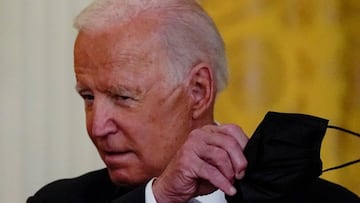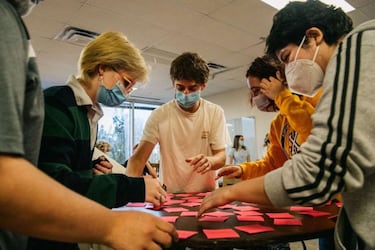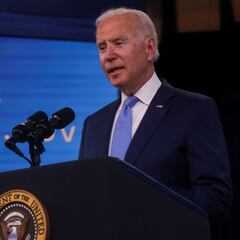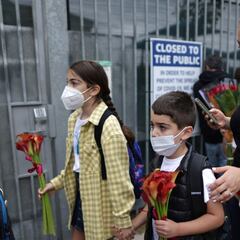What is CDC stance on face coverings in the workplace?
As the Delta variant continues to push case numbers up across the US, health authorities are urging more mask-wearing to prevent another deadly surge.

As the United States battles a new wave of covid infections, mask mandates have become as much of a political issue as a public safety consideration with several states pushing back against calls to impose greater restrictions in the face of the Delta variant after the Centers for Disease Control and Prevention (CDC) initially relaxed its recommendations for those people who are fully vaccinated.
With Delta accounting for between 80% and 87% of all covid-19 cases in the US in the last two weeks of July and only 50% of the population fully vaccinated, the efforts of the health authorities and the federal government to dampen its spread are vital to public health and the economy. According to CDC data, the highly infectious Delta variant has pushed seven-day case numbers up from an average of 13,500 in June to 92,000 at the beginning of August.
The Institute for Health Metrics and Evaluation (IHME) at the University of Washington has forecast coronavirus fatalities could reach 1,000 per day in the US by mid-September, with potentially an additional 76,000 deaths from the virus by November. Crucially, according to a report in Science, 49,000 of those deaths can be prevented if 95% of Americans mask up.
Biden transport mask order
The #DeltaVariant is more dangerous than other variants of the virus that causes #COVID19.
— CDC (@CDCgov) August 13, 2021
Get vaccinated as soon as you can. If you’re in an area of substantial or high transmission, wear a mask indoors in public, even if you’re fully vaccinated.
More: https://t.co/vwRERgaGg9.
Joe Biden has issued mandates at federal level and CDC guidelines prescribe obligatory face coverings on public transport, including airplanes, trains, and buses and during transit in stations and airports. The White House is seeking an extension to these requirements through to January after consultations with Transportation Security Administration (TSA) and the CDC, with the original recommendations due to expire in mid-September.
The current CDC order, which has been in place since soon after Biden took office in January, requires the use of face masks on nearly all forms of public transportation.
It requires face masks to be worn by all travelers on airplanes, ships, trains, subways, buses, taxis and ride-shares and at transportation hubs such as airports, bus or ferry terminals, train and subway stations and seaports.
The requirements have been the source of some friction, especially aboard US airlines, where some travelers have refused to wear masks. The Federal Aviation Administration said on Tuesday that since 1 January it has received reports from airlines of 2,867 passengers refusing to wear a mask.
CDC updates schools mask mandate

The CDC reversed course last month and recommended that students, staff and visitors mask up at K-12 schools even if fully vaccinated "in areas with substantial and high transmission.” The percentage of areas with substantial is declining along with moderate and low rates, with high transmission the only category increasing.
Mask mandates have been a political flashpoint around the US with some state governors implementing mask mandate bans for schools, threatening to withhold funding for districts that do so. The Texas Education Agency said that it would not enforce Governor Greg Abbott’s face mask ban while it faces legal challenges from multiple districts and Florida Governor Ron DeSantis has also been a vocal opponent of the mandates. Biden, meanwhile, has pointed out that Texas and Florida are two of the worst-affected states by the new wave of Delta and instructed Education Secretary Miguel Cardona to take action against those governors that have attempted to ban universal masking in schools.
Can the CDC implement universal masking in the workplace?
As of August 16, national forecasts predict 9,000–32,800 new #COVID19 hospitalizations will likely be reported on September 13. More: https://t.co/Xys80ZGlxV. pic.twitter.com/waVi7wUh6j
— CDC (@CDCgov) August 19, 2021
When it comes to the nine-to-five, there is only so much the CDC or the White House can do with state and local governments broadly responsible for mask-wearing regulations in the workplace. In the absence of a mask mandate, it falls to individual employers to decide what they ask of their employees. The Department of Labor’s Occupational Safety and Health Administration (OSHA) implemented an Emergency Temporary Standard in June covering health care sector workplaces such as hospitals and residential homes, requiring the use of face masks.
Related stories
However, the administration noted that the vast majority of fully vaccinated workers in sectors beyond health care and public transportation are no longer required to take covid safety measures in the workplace unless required to so by “federal, state, local, tribal or territorial laws, rules, and regulations.”
Experts consulted by the Society for Human Resource Management recommend that employers, to a large degree, simply exercise common sense. Those in areas with high infection rates or businesses that require large numbers of workers to be on-site and in close proximity should consider tighter covid restrictions (and some companies are implementing vaccine programs of their own volition) such as making masks mandatory.

